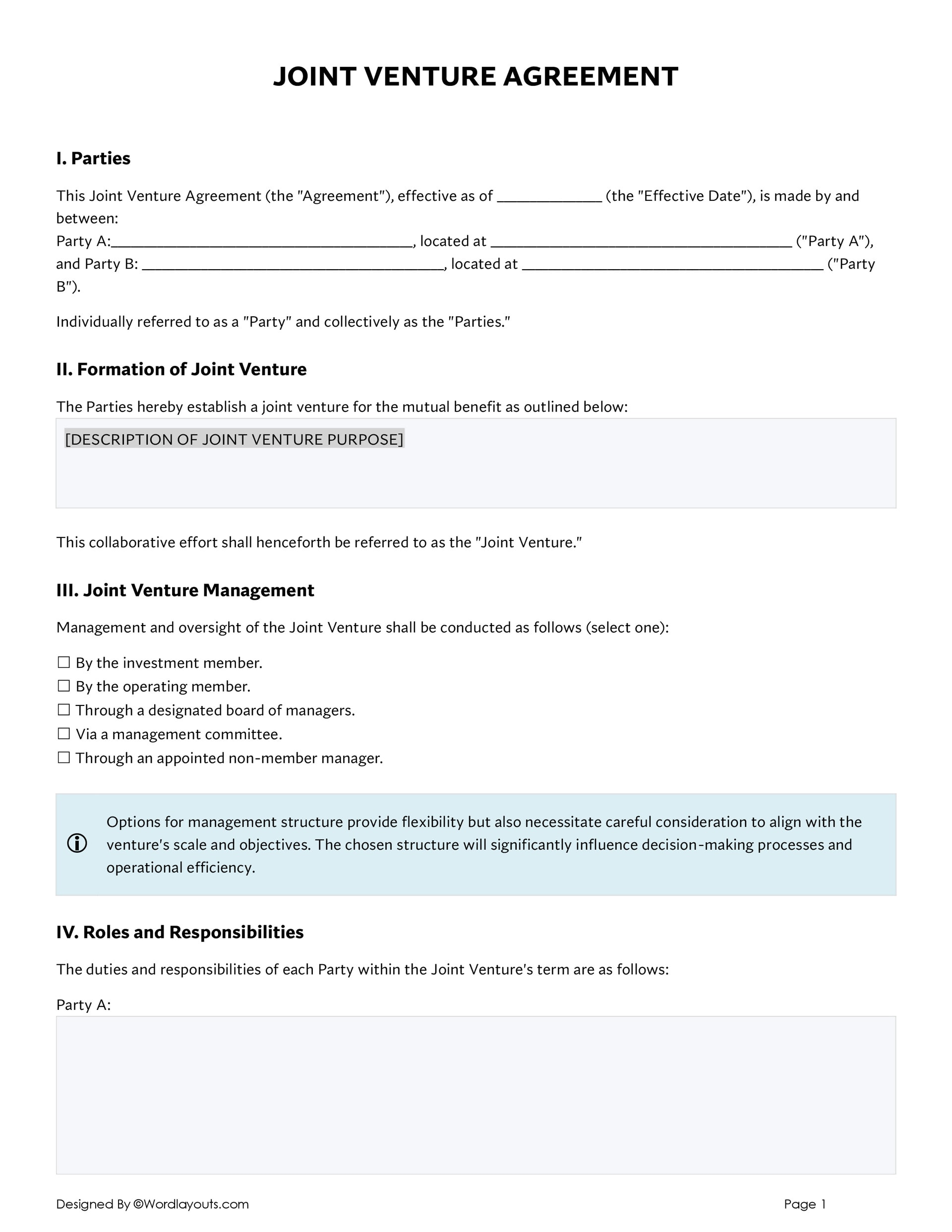
A Joint Venture Agreement is a contract between two or more parties outlining the terms, conditions, and objectives of their collaboration on a specific business project or venture. The benefit of using a Joint Venture Agreement Template is that it provides a clear, standardized framework, saving time and ensuring all critical elements of the partnership are addressed and agreed upon.
7 min read Asif Khan Written ByContent Editor & Writer Asif is a research expert and seasoned content editor, holding a degree in English Literature and Linguistics. With over three years of professional writing experience, he excels in simplifying complex and technical topics for diverse audiences. At WordLayouts, Asif leverages his expertise to decode intricate templates designed by engineers, ensuring users can fully comprehend and utilize these resources effectively.
Have you ever wondered how two companies pool their resources to conquer new markets without merging completely? The answer is through a joint venture. A joint venture is a temporary agreement between two or more parties involved in a business collaboration. Such parties contribute their resources and skills to achieve specified mutual goals. It usually outlines the terms and conditions through which two parties collaborate.
For joint ventures, businesses need a structured document that can serve as a roadmap to guide them through the whole business venture process. This document serves as a formal reference to align each party’s expectations and reduce the chances of risks and conflicts while sharing the agreed-upon profits and losses. It allows you to record the roles and responsibilities of each party, and the division of profits while providing clauses on non-compete, dispute resolution, amendments, and termination. The agreement also highlights your terms regarding amendments, assignments, severability, and governing laws. To make the agreement writing process easier, we have provided a free joint venture agreement template that can serve as a framework for writing such an agreement.


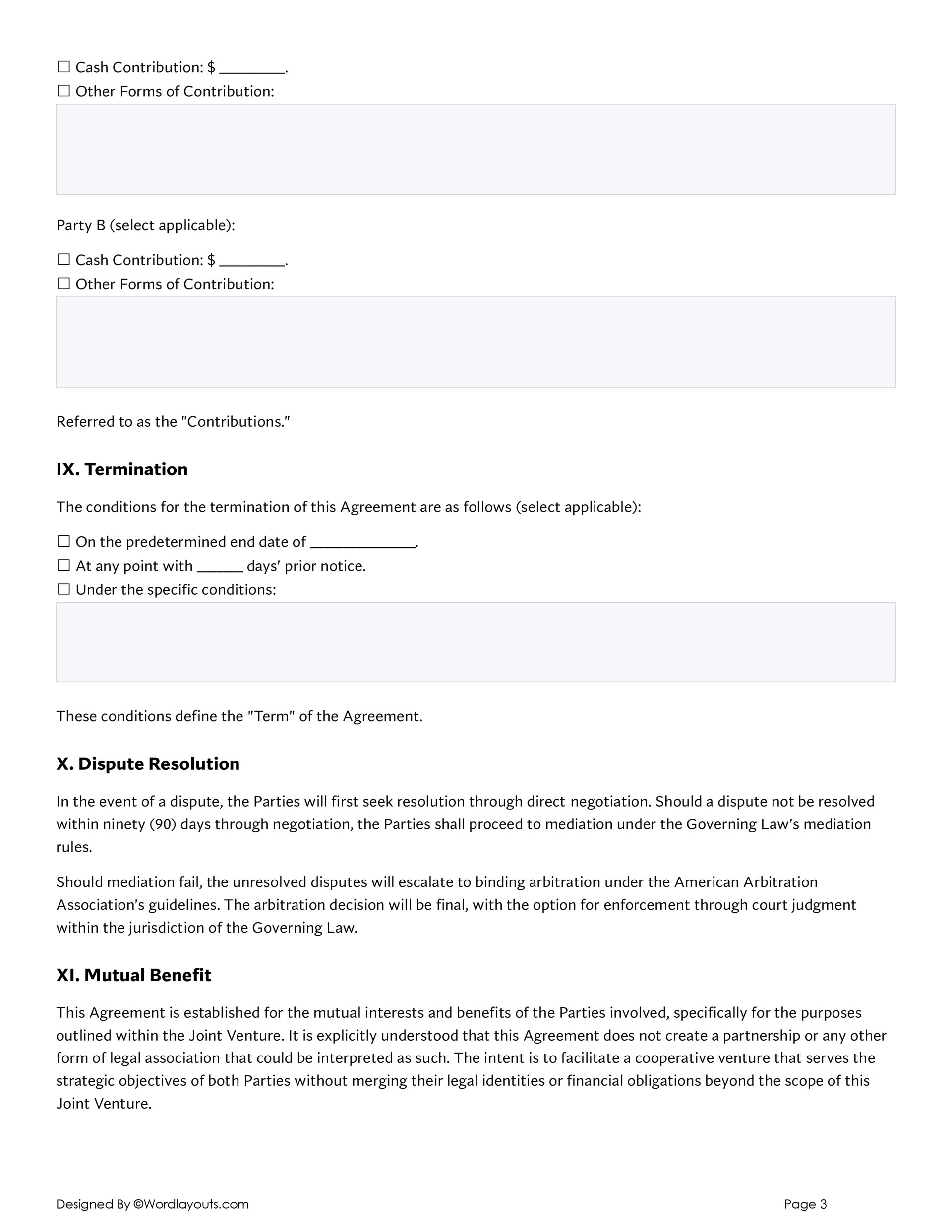
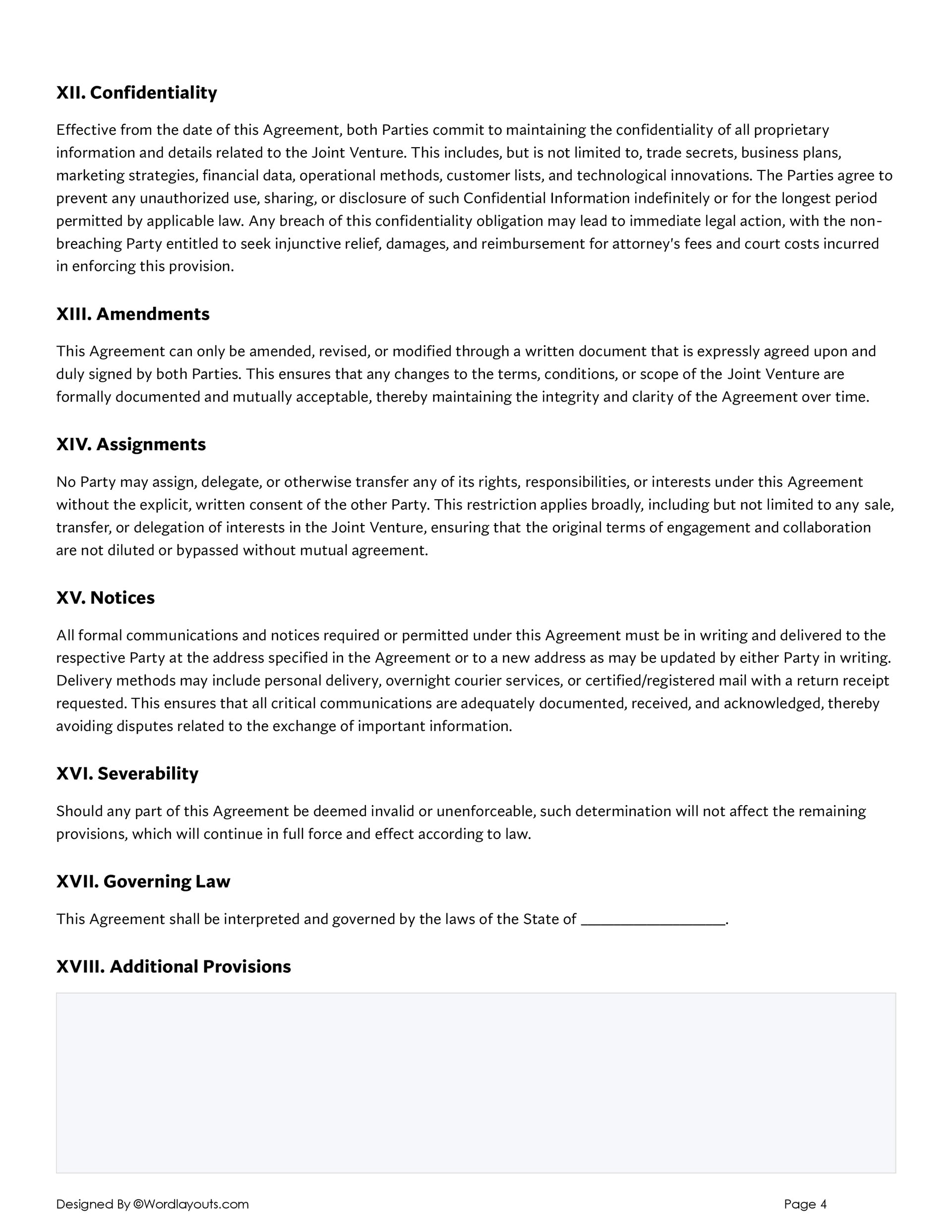
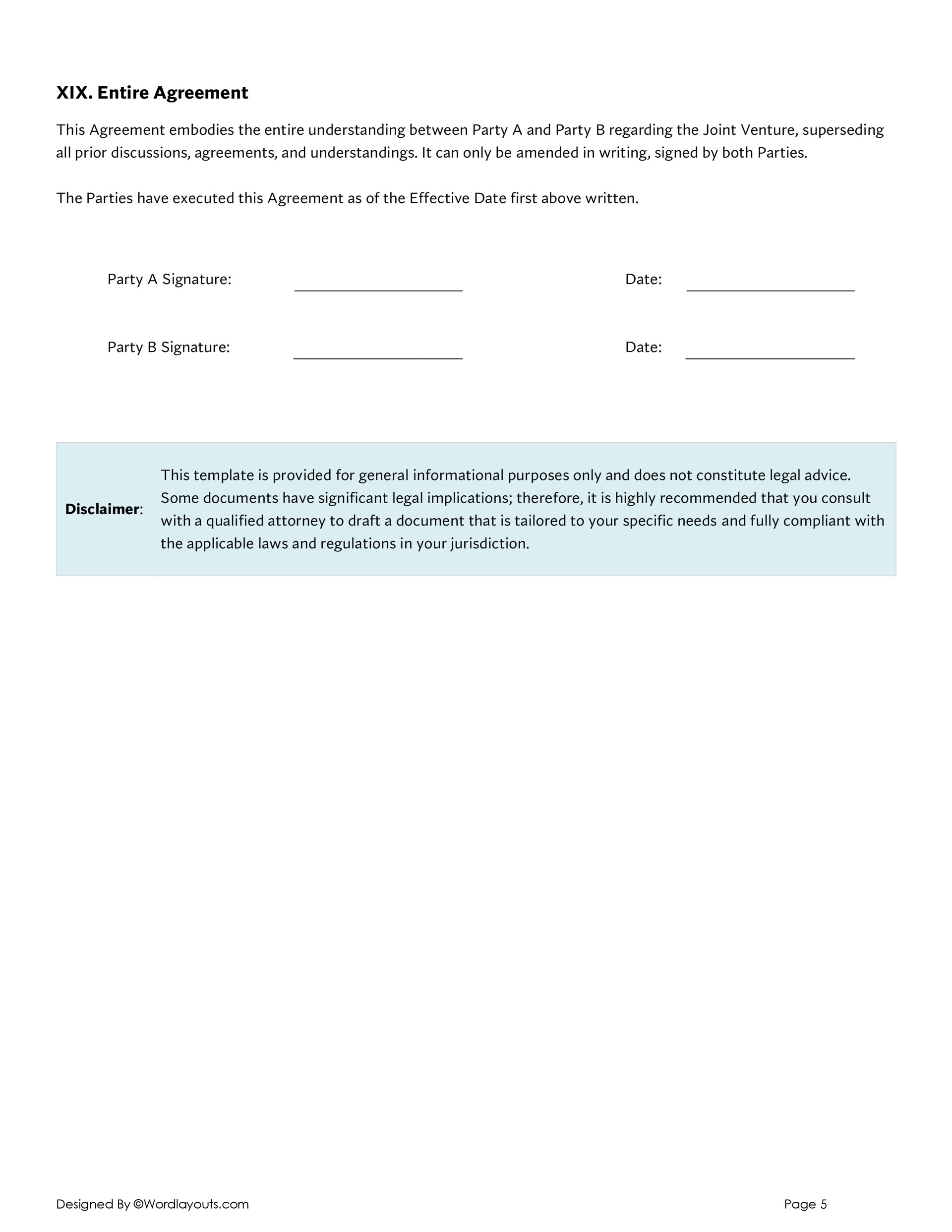
Let’s take a closer look at individual sections of this template:
Within a joint venture agreement template, the parties involved and their locations can be specified within this provided section. These parties can also write down the date of the agreement to increase legal clarity.
The nature and scope of a joint venture agreement can be made clear by describing its purpose. For example, the purpose can be resource pooling, risk sharing, market expansion, innovation and development, competitive advantage, and more based on your business priorities.
Highlighting who will be responsible for the management and oversight of the joint venture is crucial. It helps enhance the accountability and understanding of the stakeholders involved. A party would choose the authority that would be responsible for the management and oversight of the project. They can choose from the investment member, operating member, any designated board of managers, a management committee, or an appointed non-member manager.
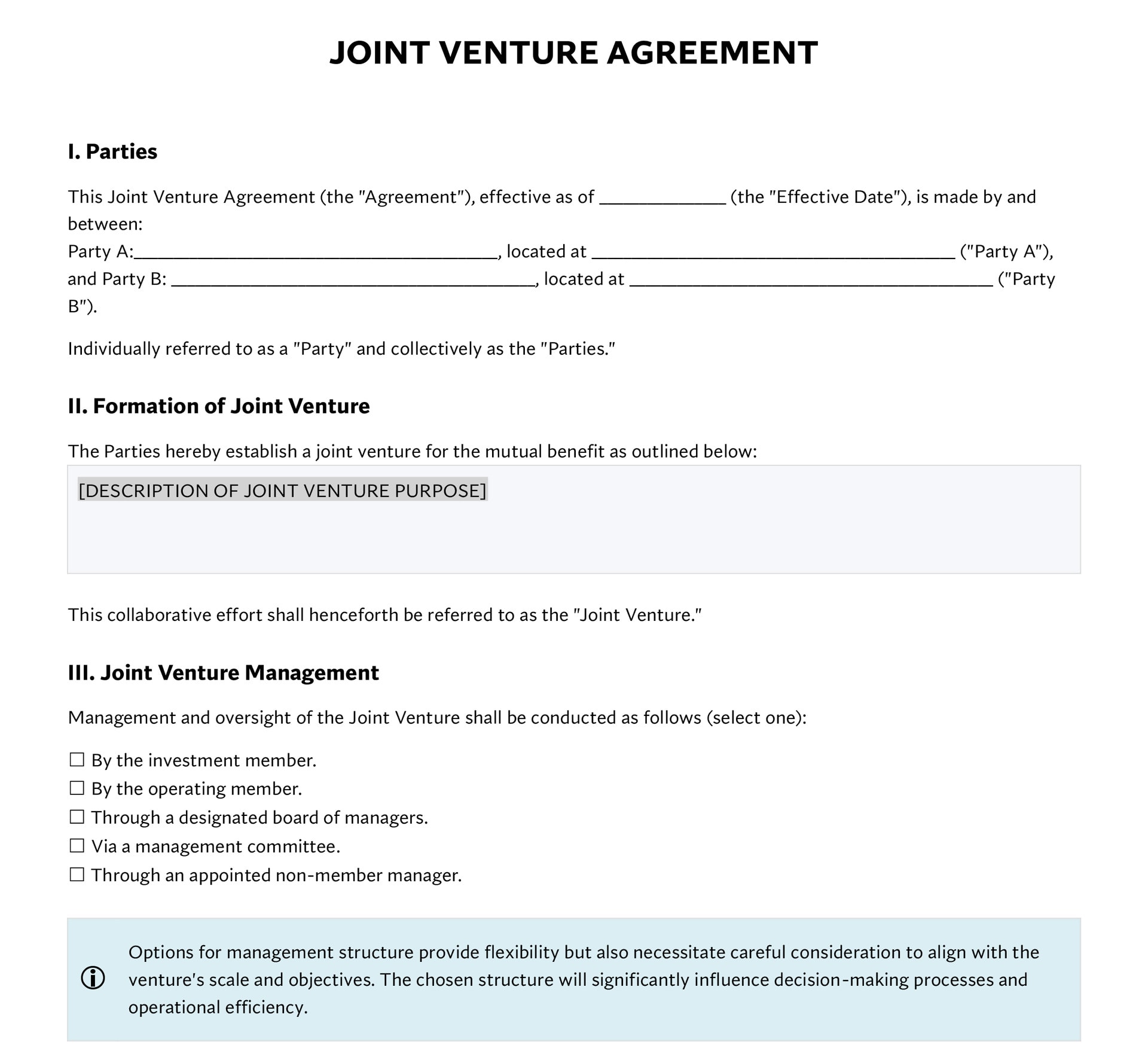
What would be the responsibilities and duties of each party in a joint venture? Specifying this can assist in defining expectations, measuring performance, and ensuring effective resource allocation. Space is provided for writing down the roles and responsibilities of each party involved.


Equity ownership in a joint venture agreement is crucial for the business project’s success. Its structure determines how the profits and losses will be shared, how the risks are distributed, and who has the control to make important decisions. Within this section, you can write the percentage of each party’s ownership to reduce misunderstandings and conflicts.
The division of profits is crucial as it can have a direct impact on the financial health and satisfaction of the parties involved. It increases the chances of financial planning, and tax considerations, and eases the alignment with contributions. There are two options provided for the distribution of profits, such as proportional to the ownership stakes, and according to the specified distribution. Proportional to ownership stakes means that a party would get the exact percentage of profits as per its percentage of investment. For example, if a party owns 40% and the other party owns 60% in a joint venture, these parties would get the profits respectively.
The other method is specified distribution, here the parties can get their already agreed-upon amounts irrelevant of their shares. For example, if party 1 has a share of 60% in the venture but they agreed to receive 50% of the profits and in this case, party 2 would get 50% profits.
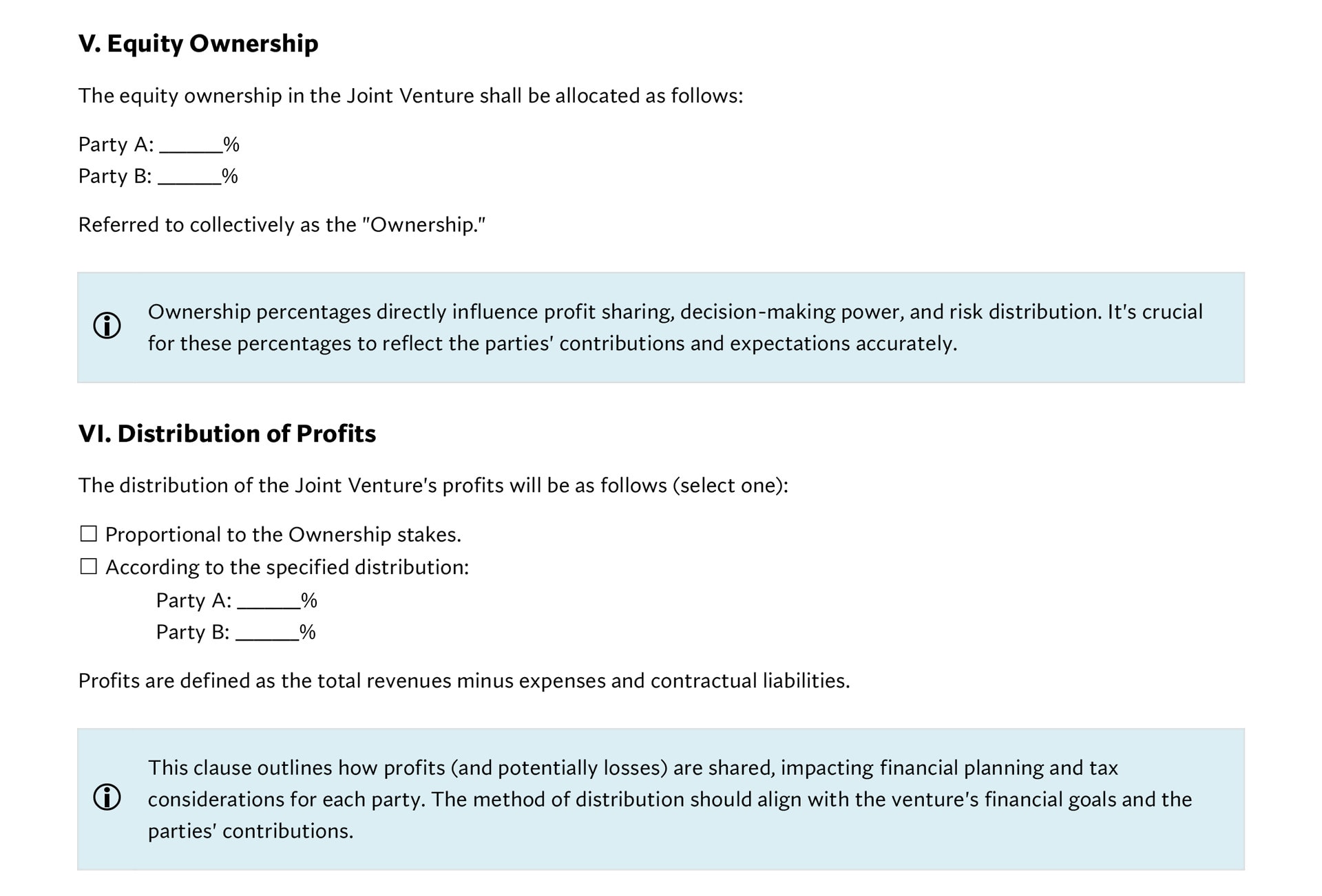
This section provides the option to the parties involved to decide whether each party is allowed to partake in similar business activities to the business venture or not. If this partaking affects the joint venture then you can decide to restrict it. Otherwise, it can be allowed.
In the joint business venture, what would be the contributions of each party involved? In this section, both parties can specify and write down their methods of contributions, these may be in the form of cash contributions (if in cash, you can write the exact amount) and other forms. Space is provided for writing other types of contributions, these may be intellectual property, expertise and knowledge, human resources, assets and equipment, and more.


At some point in life, the joint venture might be terminated and there might be some terms for this. Here, you can write an exact date when this venture will end up, and the notice period. You can also write down the terms of the agreement, such as the completion of the project/objective, breach of the agreement, financial insolvency, variation in law or regulation, the change in ownership/control, or more based on your mutual agreement.
In the worst scenarios, disputes can erupt in joint ventures. To cope with such situations, you can write down the methods of the resolution of disputes. These may include the methods of direct negotiation, mediation, and arbitration according to the American Arbitration Association’s guidelines (AAA). It also states that the parties can also customize their dispute resolution processes per their need. Keeping the practical scenario in consideration, you can also change these dispute resolution methods.
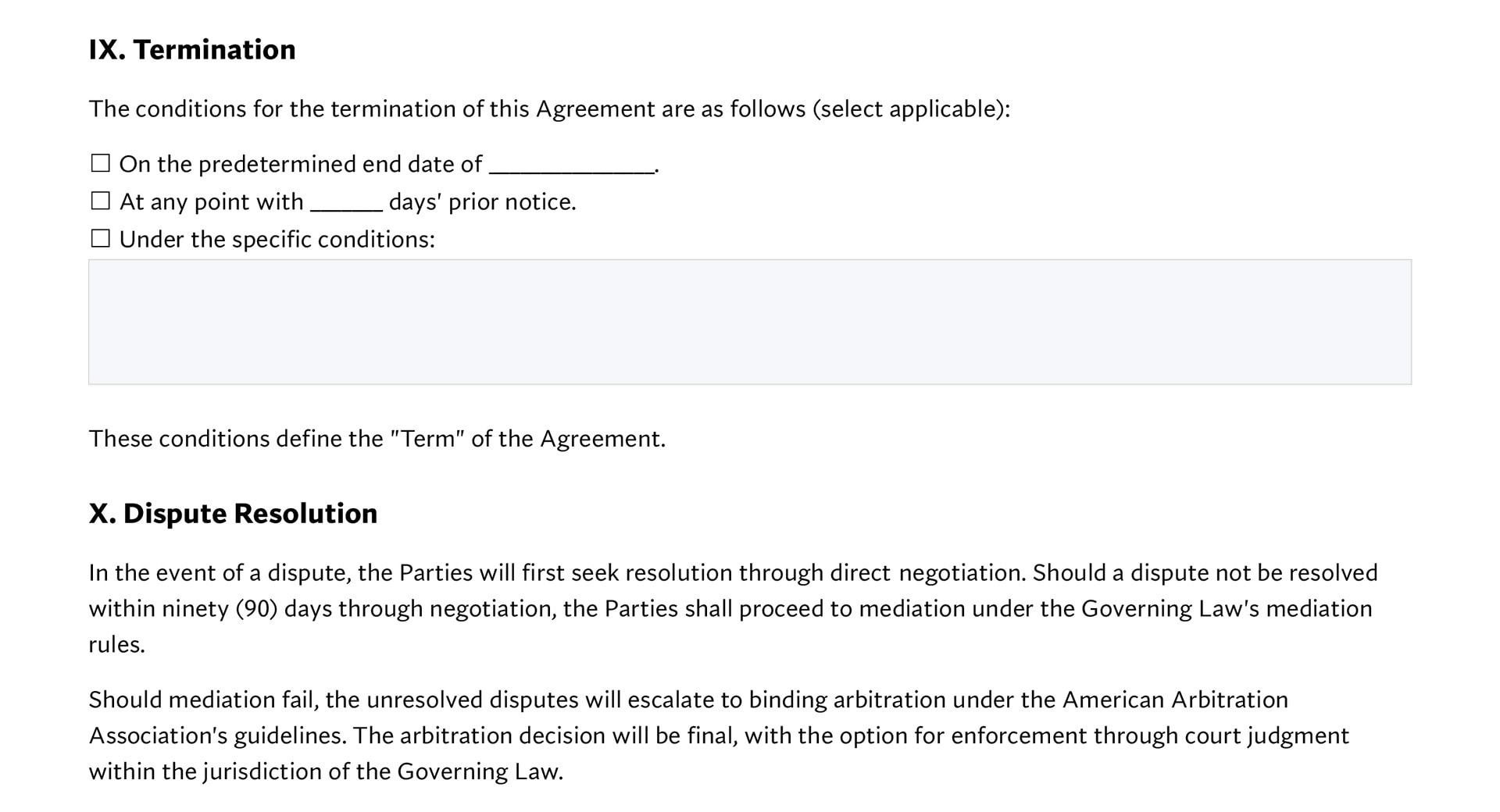
A section for clarifying the intent of the joint venture is provided, it is developed to cater to the mutual interests and benefits of the parties involved. It clarifies that this document is not created for any kind of partnership and it safeguards the legal and financial independence of the parties involved. It also specifies that the joint venture is only to achieve the strategic objectives set out by parties while ensuring the safety of individual rights and interests.
A section to protect the sensitive information of the parties/businesses involved is provided. This information may be linked to trade secrets, business plans, marketing strategies, financial data, operational methods, and more. With this section included, the parties agree to protect and prevent the unauthorized use or sharing. You can choose to make any amendments to this clause.
A good joint venture should be flexible to the modifications. Keeping this in view, a section that allows amendments, revisions, and alterations is provided. It states that amendments would only be made in written form. These can be scope expansion, financial adjustments, operational changes, or more.


In this clause of the template, it is mentioned that no party can transfer their rights or responsibilities per the agreement without the written permission of the other party. It also prevents the dilution or prevention of the original terms of engagement and collaboration further enhancing the understanding of joint venture.
Within this section of the template, you can write about the notices that may be related to communication, delivery methods, documentation, or more. For example, you can write a notice for communication that all the notices must be in written format and sent to the specified address. You can choose any delivery method, such as delivering personally, via courier, or through email. It is vital to avoid any disputes related to the exchange of important information.
This section clarifies that if in case, any part of the agreement becomes invalid or unenforceable, then the remaining agreement would be unaffected in any way and would continue in full force and effect.
The governing law section highlights that the agreement would be regulated or interpreted according to the laws of a particular state. Here, you can write the name of your state.
There might be some unique terms and conditions that might not be covered in the standard parts of the template, you can specify them here. These may include additional rights and obligations of each party, provisions related to labor laws, tax obligations, legal requirements, and more based on your needs and requirements.
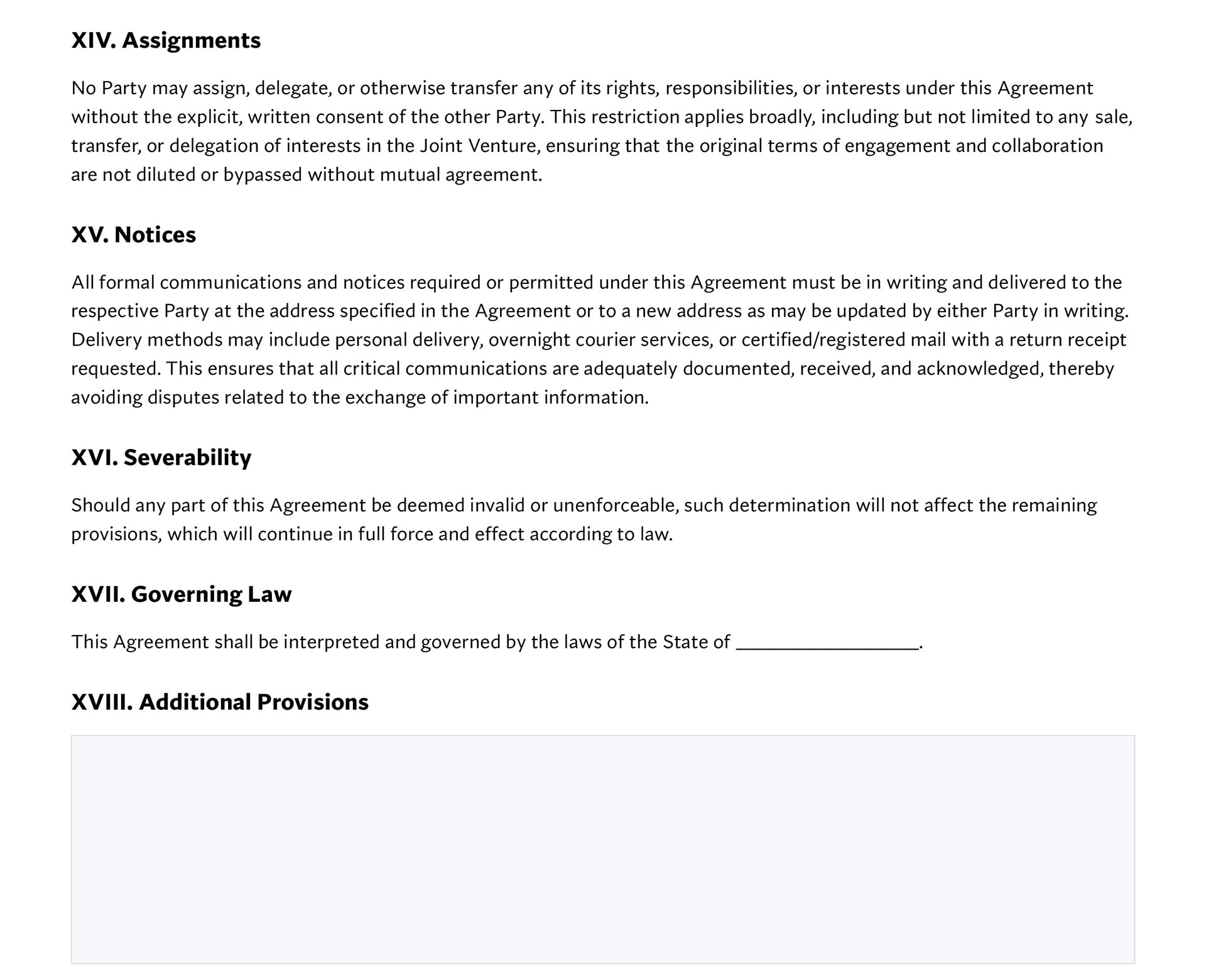
At the end of this template, both parties can write their signatures to show their agreement to all the already mentioned discussions, agreements, and understandings. It also states that the amendments would be made in the form of written documents.
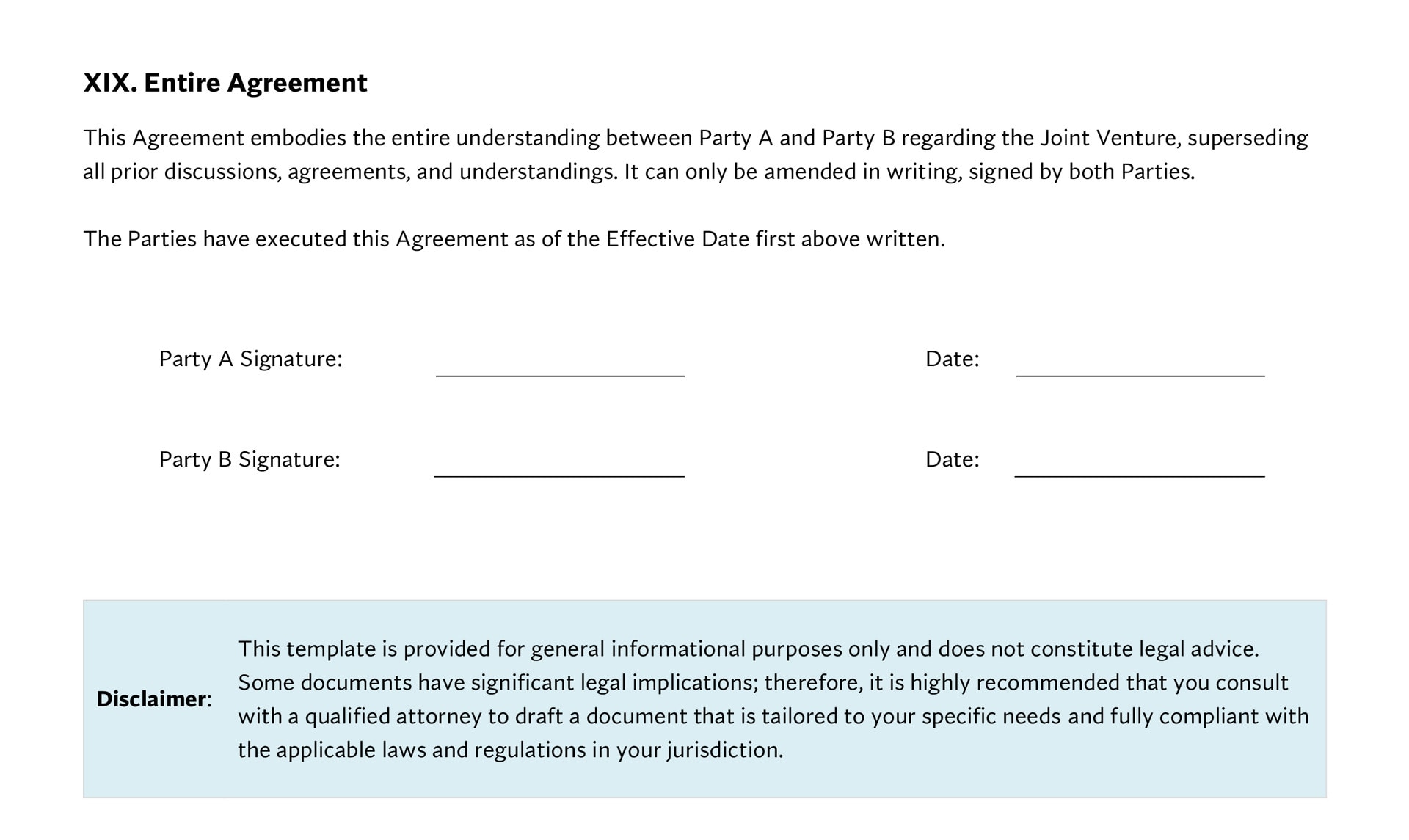
There are many successful examples of joint ventures in real life. Let’s explore some examples of joint ventures in the real world:
The venture between BMW and Brilliance Auto Group:
According to the Case Centre Org, a joint venture between BMW and Brilliance Auto Group started in 2003. This JV helped BMW in successfully targeting automobile markets in China. This joint venture was so thriving that by 2013, BMW was much ahead of its competitors, like Audi and Mercedes. BMW wanted to increase its sales in China, but because of the local laws of that time it wasn’t easy, so it joined hands with Auto Group to create BMW Brilliance. Both companies achieve their specified goals with this joint venture.
Venture between Sony and Ericsson:
As per the Sony’s news release, in 2001, Sony corporation and Ericsson signed an agreement of joint venture. Their headquarter was set up in London, aiming to be the world’ leading player in the global mobile phone market. This venture was so successful that Sony Ericsson became one of the world’s largest mobile manufacturing companies in the world.
Every business owner knows the value of collaboration and more investment in their business. The greater the investment, the greater the benefits. Here are some benefits of joint venturing:
It is optional for joint venture agreements to be written, but it is better to document the terms and conditions of ventures as it decreases the risk of ambiguities between the parties involved.
Yes, you can enter into a joint venture with a foreign company, but it is better to take into consideration the legal compliance and tax system of the other country to protect the mutual goals of both companies.
An equity joint venture involves the formation of a new entity that is owned equally by both parties; they share the profits and equity. On the contrary, a contractual joint venture does not involve the formation of a new entity but is completely contract-based, and the identities of individual businesses are maintained.
The strategies for exiting a joint venture should be written in the ‘termination clause’ of the template. Similarly, a section for guiding parties about the transfer of ownership is provided. Venturing parties can personalize them according to their needs.
You can make amendments to the agreement, but the modifications should be made in written form and signed by the parties involved. With this, you can make sure that the modifications are recorded formally and agreed upon by both parties.